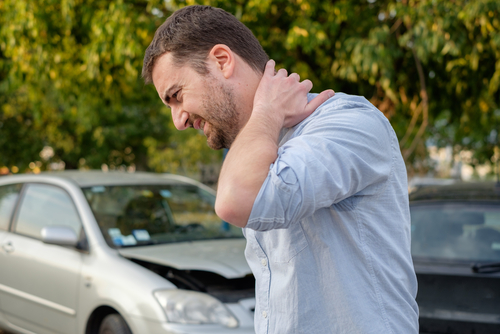
Car Accidents Can Cause Serious Whiplash
Whiplash occurs when the neck and head are suddenly forced backward and then forward, putting the cervical spine through too fast motions and extreme, quick stresses. Most cases of whiplash occur as a result of rear-end car crashes but can also happen from a side-impact or T-bone collision. Less commonly, whiplash can result from a serious slip and fall, or a sports injury.
Symptoms of Whiplash
The primary symptoms of whiplash include neck or upper back pain and headache. The pain can start immediately or develop days, weeks, or sometimes even months later. Symptoms can vary widely. Some may only suffer minor discomfort while others experience one or more of the following:
- Abnormal sensations such as burning or tingling in the upper body
- Difficulty swallowing and chewing and hoarseness (could indicate injury to the esophagus and larynx)
- Dull, radiating pain from the neck to the arms
- Fatigue
- Headache and dizziness (symptoms of a concussion, get help immediately)
- Inability to move your head with ease
- Neck stiffness
- Tenderness and pain in the chest, arms, shoulders and upper back
- Tightness or spasms of the muscles the neck or upper back
- Shoulder pain
- Upper back pain
- Weakness and/or tingling in your arms, hands, or legs
Pain medication, rest, as well as physical therapy and chiropractic care seem to be the most effective treatments for mild whiplash.
Whiplash Injury Damage and Recovery
More serious whiplash can cause changes to occur throughout the structures in and surrounding the cervical spine, causing each to become a potential source of chronic or debilitating pain. These types of injuries most often require extended therapy or even invasive surgeries that take months of rehabilitation and recovery time.
- Cerebral Hemorrhage: Tearing of brain tissue that produces bleeding, which is immediately life threatening.
- Concussion: Symptoms of concussion can include severe headaches, nausea, vomiting, dizziness, difficulty sleeping, blurred vision, tinnitus and mood swings.
- Disk Damage: Severe whiplash can cause a disk to “slip,” putting pressure on the spinal cord and producing debilitating pain. When a spinal disc’s inner core shifts from the center and comes in contact with and irritates a nearby spinal nerve root, symptoms may include sharp, shooting pain down the arm and neurological symptoms like numbness, tingling and muscle weakness in the arms. Extended therapy and/or surgery will be required.
- Spinal Cord Damage: Spinal cord trauma produces numbness, weakness and fatigue in the body below the point of injury.
- Torn Muscles and Ligaments: When the muscle or ligament is torn or ruptured, the head will be completely immobilized. Surgery is generally required, with a recovery period from four to six months.
The best way to protect yourself on the road is to wear your seat belt correctly and on every ride.
Talk to a Lawyer You Can Trust
With offices in Owensboro and Madisonville, Rhoads & Rhoads represents car accident victims throughout Western Kentucky. We offer free initial consultations, and all cases are taken on a contingency fee basis, which mean there is no payment required up front. We get paid only if we win or settle your case, so there is NO RISK involved.
Call us at 888-709-9329 or contact us by e-mail to schedule an appointment with one of our Madisonville or Owensboro personal injury attorneys.


